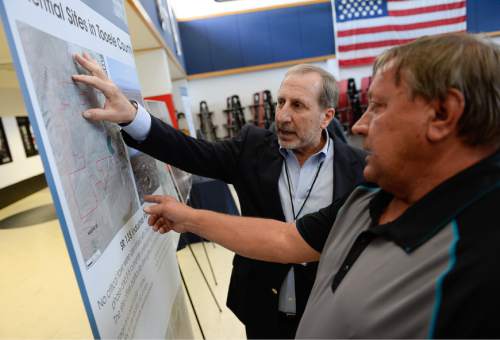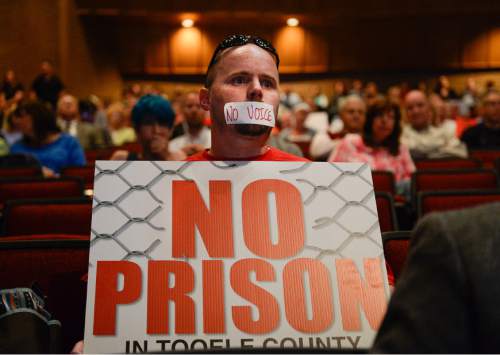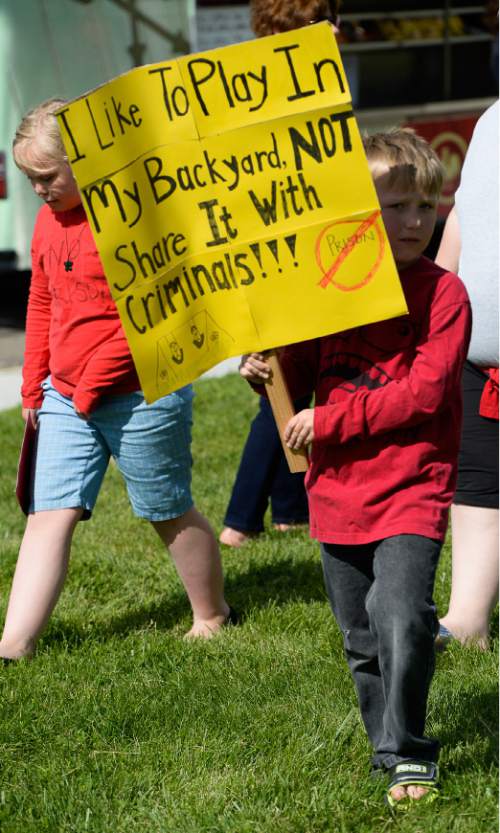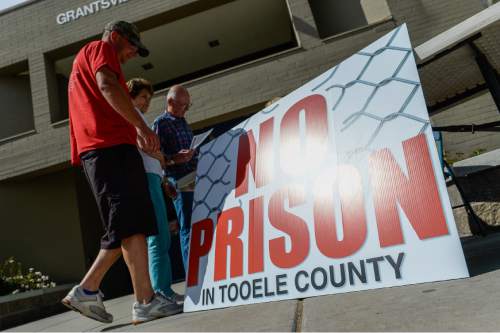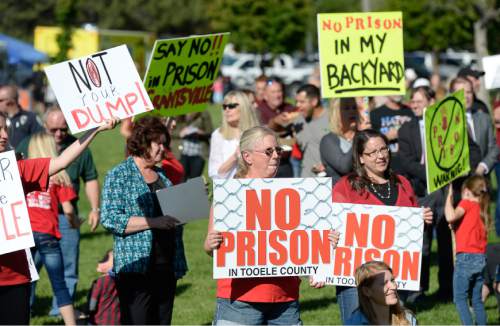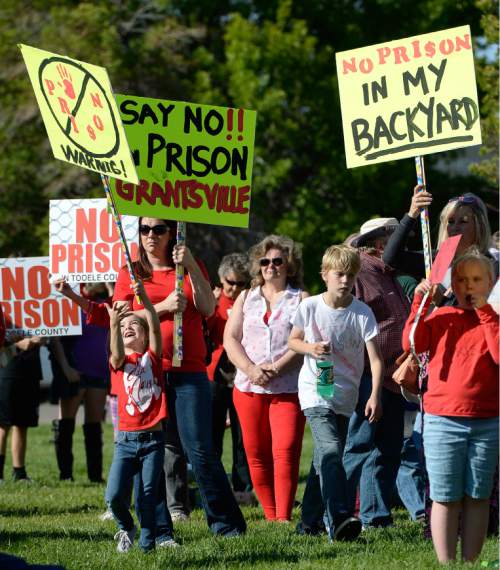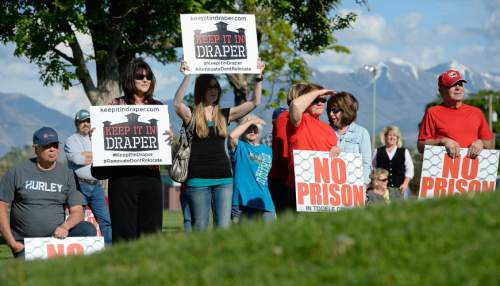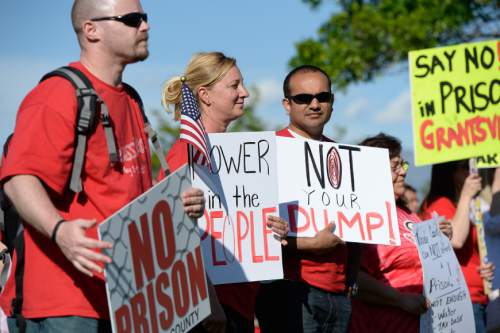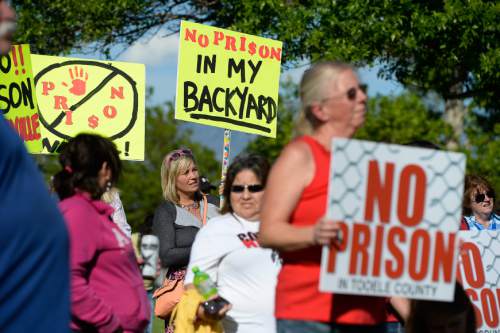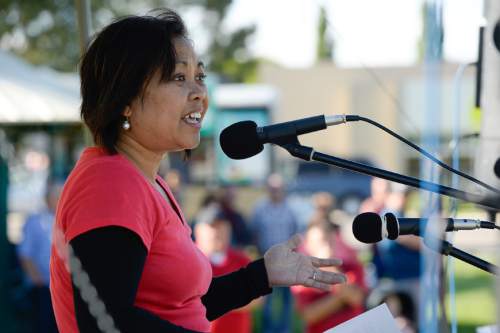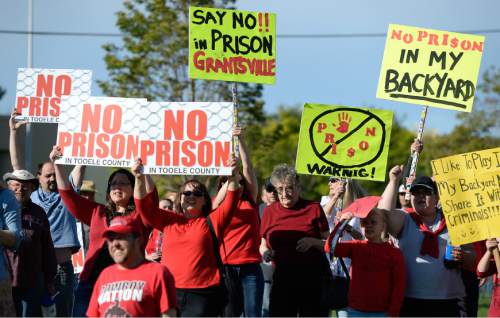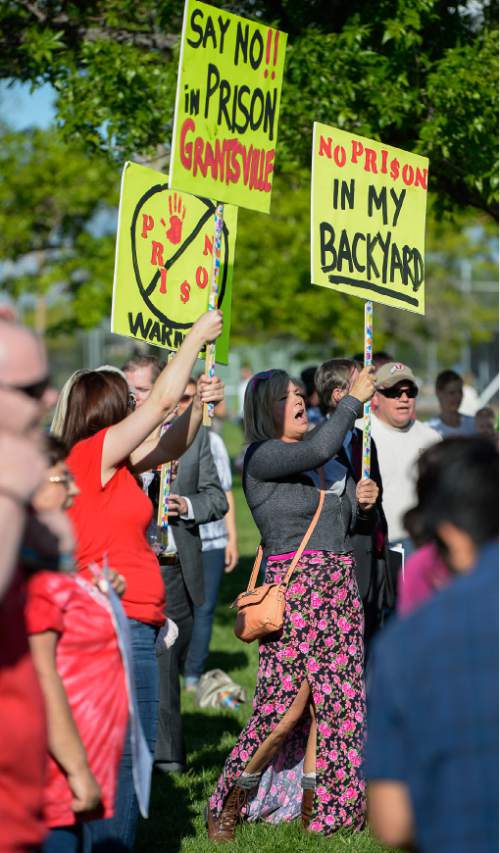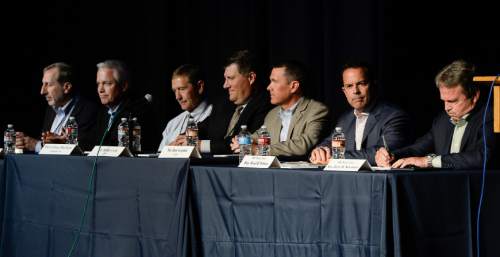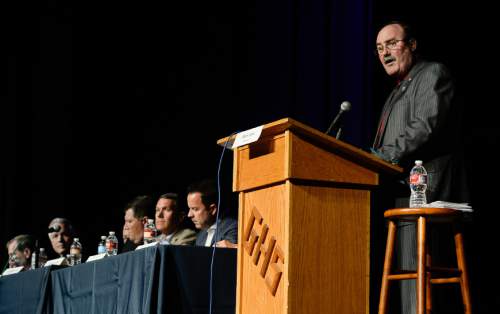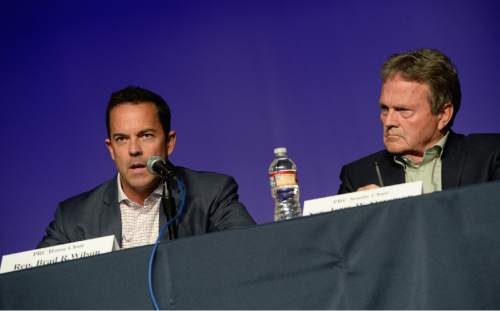This is an archived article that was published on sltrib.com in 2015, and information in the article may be outdated. It is provided only for personal research purposes and may not be reprinted.
Grantsville • A man with tape placed across his mouth walked around the auditorium. A woman in a red tie-dye shirt held a poster reading "Bring your own water + tax base. We don't have enough for you!" Police officers stood on the perimeter, scanning the crowd.
Despite the fervor of residents and local leaders, the seven representatives of the Prison Relocation Commission were perfectly calm as they sat onstage at Grantsville High School on Thursday night, answering questions with responses that the roughly 400 members of the audience didn't want to hear. They shouted over the speakers, at times drowning out their replies with boos.
That was the scene during the second of three public meetings focused on where to move the Utah State Prison from its current location in Draper. One of the potential sites, on 500 acres behind a Wal-Mart Distribution Center in Tooele County, drove Thursday's discussion, which continuously returned to one topic of concern: water.
Robert Nardi, a consultant hired by the state, said the water issue is easy to solve. Ideally the commission would form an agreement with Grantsville, but if that's not a possibility — the City Council recently passed a resolution to not allow any water or sewer agreements with a prison — the state would build an on-site source working with the current landowner, who has water rights. State-employed water engineers have already begun an audit to explore that path.
"Those water rights are going to be front and center," Nardi said. "[But] we don't want to be in the water-supply business."
Jewel Allen, co-founder of the activist group No Prison in Tooele County, has lived in Grantsville for 14 years and said water is also a top concern for those rallying against the project. She lives seven miles from the relocation site and has personally seen declining water levels in nearby wells.
"Water is a real big issue for us out here," she said. "We'd rather say 'no' now than deal with the situation later and have to make the best of a bad situation."
Gunnison Mayor Bruce Blackham said the water situation in his central Utah city, which houses a regional prison, isn't as dire as it might seem — but there are issues to cope with, he said.
"You've got challenges," he said.
Gunnison's Central Utah Correctional Facility appropriates funds to the city and provides additional compensation for unforeseen environmental impacts — which could be part of an agreement made with a prison in Tooele County.
Resident Everetta Hardman is concerned about safety. Her grandchildren visit often, and if her neighbors are the prisoners at the facility across the street, she will be "scared to death" to let the children play in her front yard.
Of the four relocation sites being considered by the commission, the Grantsville plot is the nearest to residents. One person at the meeting asked why the state isn't building in a more remote location.
Ron Gordon with the Utah Commission on Criminal and Juvenile Justice said it's a trade-off: the state can build in the middle of nowhere or have rehabilitation options by constructing near a small community. He favors the latter.
Many citizens also questioned why the prison couldn't be rebuilt or remodeled at its current location. State Rep. Brad Wilson, R-Kaysville, co-chairman of the commission, tried to head off any debate on that topic early on.
"We're not here to discuss whether we're moving the prison or not," Wilson said. "That … has already been decided by the Legislature."
Relocation will allow for state-of-the-art rehabilitation and therapy programs, he said. And remodeling would be "impractical" for the current prisoners in Draper.
The Grantsville site is the only potential prison location in Tooele County; Tuesday, the Larry H. Miller family pulled its 900-acre parcel, adjacent to Miller Motorsports Park, from consideration.
The commission is also looking at a spot in Salt Lake City — about five miles west of the Salt Lake City International Airport — and two in northern Utah County. The latter sites, one at the southern edge of Eagle Mountain and the other just outside tiny Fairfield, will be the focus of the third and final public information meeting, set for Tuesday.
There will also be a formal public hearing June 16.
The commission is expected to present a final recommendation to the Legislature by Aug. 1. Gov. Gary Herbert will then likely call a special session for a vote, with plans to break ground on the 4,000-bed penitentiary in 2016.
The cost of the new facility has been estimated at around $500 million, but more audits are being conducted.
ctanner@sltrib.com Final prison relocation public information meeting
Tuesday, June 2
Open house 4-7 p.m.
Question and answer 7-9 p.m.
Frontier Middle School
1427 Mid Valley Road
Eagle Mountain
Formal public hearing
Tuesday, June 16
Time to be determined
Utah State Capitol


